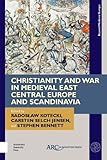Christianity and War in Medieval East Central Europe and Scandinavia / ed. by Radosław Kotecki, Stephen Bennett, Carsten Selch Jensen.
Material type: TextSeries: Beyond Medieval EuropePublisher: Leeds : ARC Humanities Press, [2021]Copyright date: ©2021Description: 1 online resource (324 p.)Content type:
TextSeries: Beyond Medieval EuropePublisher: Leeds : ARC Humanities Press, [2021]Copyright date: ©2021Description: 1 online resource (324 p.)Content type: - 9781641891349
- Christianity and politics -- Europe, Eastern -- History -- To 1500
- Christianity and politics -- Scandinavia -- History -- To 1500
- Church and state -- Europe, Eastern -- History -- To 1500
- Church and state -- Scandinavia -- History -- To 1500
- Church history -- Middle Ages, 600-1500
- Military history, Medieval
- History
- HISTORY / Medieval
- Baltic region
- Christianity and War
- East Central Europe
- Ecclesiastical History
- Holy War
- Medieval Scandinavia
- Military History
- Northern and Eastern Europe
- Warrior-Bishops
- medieval clergy
- medieval warfare
- 947.000902 23
- online - DeGruyter
| Item type | Current library | Call number | URL | Status | Notes | Barcode | |
|---|---|---|---|---|---|---|---|
 eBook
eBook
|
Biblioteca "Angelicum" Pont. Univ. S.Tommaso d'Aquino Nuvola online | online - DeGruyter (Browse shelf(Opens below)) | Online access | Not for loan (Accesso limitato) | Accesso per gli utenti autorizzati / Access for authorized users | (dgr)9781641891349 |
Frontmatter -- CONTENTS -- List of Illustrations -- Editors’ Preface -- List of Abbreviations -- Christianity and War in Medieval East Central Europe and Scandinavia: An Introduction -- PART ONE: THE CHURCH AND WAR -- Chapter 1. The Role of the Dalmatian Bishops and Archbishops in Warfare During the Twelfth and Thirteenth Centuries: A Case Study on the Archbishops of Split -- Chapter 2. Thirteenth- Century Hungarian Prelates at War -- Chapter 3. The Image of “Warrior- Bishops” in the Northern Tradition of the Crusades -- Chapter 4. Memory of the “Warrior- Bishops” of Płock in the Writings of Jan Długosz -- Chapter 5. Preachers of War: Dominican Friars as Promoters of the Crusades in the Baltic Region in the Thirteenth Century -- Chapter 6. Depictions of Violence in Late Romanesque Mural Paintings in Denmark -- PART TWO: RELIGION IN WAR AND ITS CULTURAL EXPRESSIONS -- Chapter 7. Religious Rituals of War in Medieval Hungary Under the Árpád Dynasty -- Chapter 8. Pious Rulers, Princely Clerics, and Angels of Light: “Imperial Holy War” Imagery in Twelfth- Century Poland and Rus` -- Chapter 9. Religion and War in Saxo Grammaticus’s Gesta Danorum: The Examples of Bishop Absalon and King Valdemar I -- Chapter 10. Rhetoric of War: The Imagination of War in Medieval Written Sources (Central and Eastern Europe in the High Middle Ages) -- Chapter 11. Civil War as Holy War? Polyphonic Discourses of Warfare During the Internal Struggles in Norway in the Twelfth Century -- Chapter 12. Martyrdom on the Field of Battle in Livonia During Thirteenth- Century Holy Wars and Christianization: Popular Belief and the Image of a Catholic Frontier -- Chapter 13. Orthodox Responses to the Baltic Crusades -- Selected Bibliography -- Index
restricted access online access with authorization star
http://purl.org/coar/access_right/c_16ec
This collaborative collection provides fresh perspectives on Christianity and the conduct of war in medieval East Central Europe and Scandinavia, investigating the intersection between religion, culture, and warfare in territories that were only integrated into Christendom in the Central Middle Ages. The contributors analyze cultures that lay outside Charlemagne's limes and the frontiers of the Byzantine Empire, to consider a region stretching from the Balkans to the south, through Hungary and the Slavic lands (Poland, Bohemia, Rus), to the Baltic coastline with Polabia, Pomerania, Prussia, and Estonia, and reaching into Scandinavia. The volume considers clerics as military leaders and propagandists, the role of Christian ritual and doctrine in warfare, and the adaptation and transformation of indigenous military cultures. It uncovers new information on perceptions of war and analyzes how local practices were incorporated into clerical narratives, enabling the reader to achieve a complete understanding of the period.
This collaborative collection provides fresh perspectives on Christianity and the conduct of war in medieval East Central Europe and Scandinavia, investigating the intersection between religion, culture, and warfare in territories that were only integrated into Christendom in the Central Middle Ages. The contributors analyze cultures that lay outside Charlemagne's limes and the frontiers of the Byzantine Empire, to consider a region stretching from the Balkans to the south, through Hungary and the Slavic lands (Poland, Bohemia, Rus), to the Baltic coastline with Polabia, Pomerania, Prussia, and Estonia, and reaching into Scandinavia.[-][-]The volume considers clerics as military leaders and propagandists, the role of Christian ritual and doctrine in warfare, and the adaptation and transformation of indigenous military cultures. It uncovers new information on perceptions of war and analyzes how local practices were incorporated into clerical narratives, enabling the reader to achieve a complete understanding of the period.
Mode of access: Internet via World Wide Web.
In English.
Description based on online resource; title from PDF title page (publisher's Web site, viewed 01. Dez 2022)


